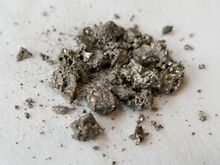Chemistry:Cobalt(II) selenide

| |
| Names | |
|---|---|
| IUPAC name
Cobalt(II) selenide
| |
| Identifiers | |
3D model (JSmol)
|
|
| EC Number |
|
PubChem CID
|
|
| |
| |
| Properties | |
| CoSe | |
| Molar mass | 137.89 g/mol[1] |
| Melting point | 1,055 °C (1,931 °F; 1,328 K)[1] |
| Insoluble[1] | |
| Structure[2] | |
| Hexagonal (NiAs), hP4 | |
| P63/mmc, No. 194 | |
a = 0.362 nm, b = 0.362 nm, c = 0.52 nm α = 90°, β = 90°, γ = 120°
| |
Formula units (Z)
|
2 |
Except where otherwise noted, data are given for materials in their standard state (at 25 °C [77 °F], 100 kPa). | |
| Infobox references | |
Cobalt(II) selenide is an inorganic compound with the chemical formula CoSe.[3] The mineral form of this compound is known as freboldite.[4][5] Similar minerals include trogtalite (CoSe2)[6][7] and bornhardtite (Co2+Co3+2Se4).[8][9]
Preparation
Cobalt(II) selenide can be prepared by placing cobalt selenite in 10% sodium hydroxide solution, stirring it, and adding it drop by drop into the 10% sodium hydroxide solution of sodium thiosulfate. When the color of the reaction solution no longer changes, let it stand, filter, and use water and wash it with 5% hydrochloric acid and dry it to obtain CoSe.[10]
Cobalt(II) selenide can also be produced by the electrodeposition reaction of cobalt(II) acetate and sodium selenite in acidic solution. When the pH is 3.5, the ratio of cobalt and selenium in the compound is closest to 1:1; too low a pH will make the compound rich in selenium, while higher The pH will be rich in cobalt.[11]
Applications
Ag+-doped cobalt(II) selenide nanoparticles can be used as catalysts for water electrolysis.[12] Cobalt(II) selenide materials mixed with tin selenide can be used as electrodes in dye-sensitized solar cells.[13]
Related compounds
Cobalt(II) selenide can exist in the form of non-stoichiometric compounds. Dissolve cobalt(II) chloride and urea in deionized water in a stoichiometric ratio of 1:1, heat to 120 °C in a stainless steel reactor to obtain pink precipitate Co(CO3)0.35Cl0.20(OH)1.10, wash and vacuum dry. In addition, add selenium powder to the sodium borohydride aqueous solution and shake until the black solid disappears to obtain a NaHSe solution. Add the cobalt source and selenium source into the reaction kettle to perform solvothermal (ethanol-water) reaction to obtain Co0.85Se.[14] This compound is ferromagnetic at room temperature.[15]
In addition, Co9Se8,[16] Co2Se3, Co3Se4 and CoSe2 have also been reported.[14]
References
- ↑ 1.0 1.1 1.2 Cite error: Invalid
<ref>tag; no text was provided for refs namedcrc - ↑ Kamimura, T.; Sato, M.; Takahashi, H.; Mori, N.; Yoshida, H.; Kaneko, T. (1992). "Pressure-induced phase transition in Fe-Se and Fe-S systems with a Ni As-type structure". Journal of Magnetism and Magnetic Materials 104-107: 255–256. doi:10.1016/0304-8853(92)90787-O. Bibcode: 1992JMMM..104..255K.
- ↑ University of Akron Chemical Database
- ↑ "Freboldite". https://www.mindat.org/min-1602.html.
- ↑ "List of Minerals". 21 March 2011. https://www.ima-mineralogy.org/Minlist.htm.
- ↑ "Trogtalite". https://www.mindat.org/min-4028.html.
- ↑ "List of Minerals". 21 March 2011. https://www.ima-mineralogy.org/Minlist.htm.
- ↑ "Bornhardtite". https://www.mindat.org/min-726.html.
- ↑ "List of Minerals". 21 March 2011. https://www.ima-mineralogy.org/Minlist.htm.
- ↑ 朱文祥. 无机化合物制备手册. 化学工业出版社, 2006. pp 653-654. 【IX-20】硒化钴. ISBN 7-5025-8537-0
- ↑ 中国科学院青岛生物能源与过程研究所机构知识库. "中国科学院青岛生物能源与过程研究所机构知识库". http://ir.qibebt.ac.cn/password-login;jsessionid=D8CD29F35EB0394050FC435478F5977F.
- ↑ "Wayback Machine". 2017-08-14. https://web.archive.org/web/20170814102925/http://www.whxb.pku.edu.cn/CN/article/downloadArticleFile.do?attachType=PDF&id=29728.
- ↑ Jia, Jinbiao; Wu, Jihuai; Dong, Jia; Zhou, Pei; Wu, Shaoyun; Lin, Jianming (Dec 2015). "Cobalt selenide/tin selenide hybrid used as a high efficient counter electrode for dye-sensitized solar cells" (in en). Journal of Materials Science: Materials in Electronics 26 (12): 10102–10108. doi:10.1007/s10854-015-3694-8. ISSN 0957-4522. http://link.springer.com/10.1007/s10854-015-3694-8.
- ↑ 14.0 14.1 "Syntehsis of polycrystalline cobalt selenide nanotubes and their catalytic and capacitative behaviors". http://or.nsfc.gov.cn/bitstream/00001903-5/207698/1/1000006264782.pdf.
- ↑ "一种非整数比硒化钴纳米片的合成与性质研究". http://cpfd.cnki.com.cn/Article/CPFDTOTAL-ZGHY201204004076.htm.
- ↑ Vayner, Ellen; Sidik, Reyimjan A.; Anderson, Alfred B.; Popov, Branko N. (2007-07-01). "Experimental and Theoretical Study of Cobalt Selenide as a Catalyst for O 2 Electroreduction" (in en). The Journal of Physical Chemistry C 111 (28): 10508–10513. doi:10.1021/jp072056m. ISSN 1932-7447. https://pubs.acs.org/doi/10.1021/jp072056m.
 |

